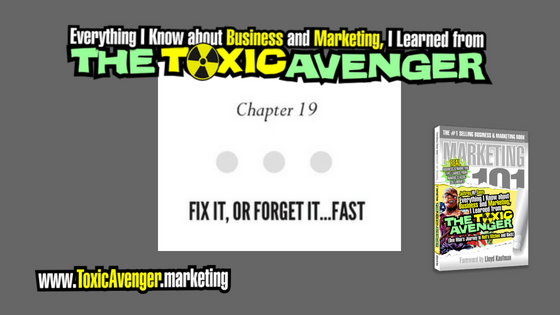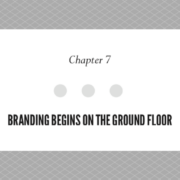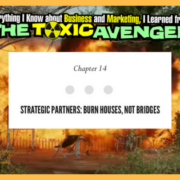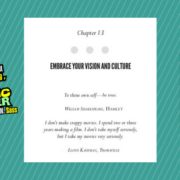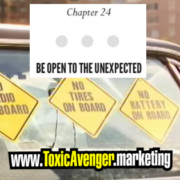Chapter 19: Fix It, or Forget It… Fast!
Greetings from Tromaville! Here is Chapter 19 from my book, Everything I Know about Business and Marketing, I Learned from THE TOXIC AVENGER. In this chapter, we take a look at the importance of having a plan B and making sure every day is moving your business agenda forward!
If you haven’t done so already, you can read the Foreword by Troma co-founder, Lloyd Kaufman, and the Introduction to the book as well as Chapter 1, 2, 3, 4, 5 and 6, 7 ,8, 9, 10, 11, 12, 13, 14, 15, 16, 17 and 18. You can also see me read a few chapters live, along with Lloyd and Toxie, at Florida Supercon as well as a few chapters I read on Facebook Live. Stay tuned for additional chapters to be published here. If you like what you read and can’t wait for more, please don’t be shy. You can buy the book now on Amazon (and also please don’t be shy about sharing, and reviewing the book when you do read it.) Both Toxie and I greatly appreciate your support! – Jeff Sass
Chapter 19: Fix It, or Forget It… Fast
On a movie set, there is no shortage of things that can go wrong. Your camera truck can be stolen. Your location can be locked when you arrive with the owner completely denying they ever gave you permission to come and film there. Your lead actress can refuse to come out of the bathroom to film a scene or refuse to kiss the leading monster—er, man, despite the romantic scene that was in the script and agreed to when she was hired. Essential costumes and props disappear. Cars containing essential talent or equipment break down. It rains (it pours). Actors show up drunk. Actors show up without knowing their lines. Actors don’t show up. Assholes do show up. Equipment breaks. Crew members quit. Sound people forget to record. Camera people forget to load film. It rains (it pours). Teamsters protest and interfere. Stunts don’t work as planned. You run out of power. You run out of light. You run out of time. You run out of money. You run out screaming.
Shit happens.
Lots of shit.
Every day.
All the time.
It is fun, really.
That’s Hollywood (well, Tromaville).
But on a set, the clock is always ticking, and whether you are on a shoestring Indy budget or a gazillion-dollar studio budget, time is still money. There are pages to cover, and a schedule to follow. The shit may hit the fan, but the film still needs to end up in the can. So, when something does go wrong, and it will, you need to make a decision. You need to fix it, fast, or work around it, fast. Innovation and creativity will save the day more than money will, and that’s a solid lesson for any business.
Even if you have the money, replacing something that breaks can take time and delay production. What’s the backup plan? To successfully make a B-movie, you’d better always have a plan B (and frankly, the same applies even if you are attempting to make a blockbuster).
Do you have a true plan B for your business? When making a movie, learning to be prepared and expect the unexpected is essential (which actually makes the unexpected the expected).
Filming on a soundstage is expensive and outside the budget of most independent films. As a result, to get great on-screen production values at a reasonable cost, many Indy films are shot “on location,” leveraging the scenic beauty of the real world in lieu of the fabricated beauty and control of a costly studio set. But in the real world, you can’t control Mother Nature, and your location is always at risk of being shut down by bad weather. Having a plan B means that for every day of exterior filming, you had better have an alternate scene ready to be shot indoors should Mother Nature decide to fool you for a change. That means an alternative location, indoors and nearby, so you could quickly and efficiently save the day.
So, when we were filming The Toxic Avenger Part II (and Part III) in and around the lovely town of Peekskill, NY, we always had several indoor “sets” ready and waiting inside the abandoned Masonic temple that doubled as our local production office. While these makeshift sets were far from “studio” quality, they were good enough, and if Mother Nature decided to poop on our heads, without hesitation we knew exactly what to do, where to go, and how to make the day as productive as possible.
This is a lesson that is easy to forget in the nonmovie world because in most businesses there is a lot more flexibility on a day-to-day basis than there is on a movie set. You may be under pressure to meet a monthly or quarterly goal, but what about losing sunlight before all the necessary pages are shot in a location you absolutely, positively can never return to after the end of the day? Movies function day to day, and that fosters a discipline that would be beneficial to apply to any business. Every day on set must contribute to the end-goal of a finished film.
Is every day at your office contributing to your end-goal? It’s hard, and something I try to remind myself of, not always successfully.
•••
That’s Chapter 19 – Do you always have a plan B? Stay tuned for Chapter 20: “This Means WAR!” which explores the importance breaking down your objectives to manageable tasks… similar to the strategies of war (and Troma’s WAR).…
The book in previous posts:
Foreword, by Lloyd Kaufman
Introduction: Lights, Camera, Action!
Chapter 1: Welcome to Tromaville!
Chapter 2: The Troma Building
Chapter 3: Meet the Moguls
Chapter 4: Trailer Trash
Chapters 5 and 6: Working FREE-lance & Becoming a Full-time Tromite
Chapter 7: Branding Begins on the Ground Floor
Chapter 8: The Power of We
Chapter 9: Old Yeller (and Be Your Brand)
Chapter 10: Find Something to Believe In
Chapter 11: Show Up!
Chapter 12: Sink or Swim!
Chapter 13: Embrace your Vision and Culture!
Chapter 14: Strategic Partners – Burn Houses, Not Bridges
Chapter 15: If You Don’t Want to Swallow a Frog, Start with a Stunt
Chapter 16: Repurpose, On Purpose!
Chapter 17: Always Salute the Schwag!
Chapter 18: Playing by the Rules


